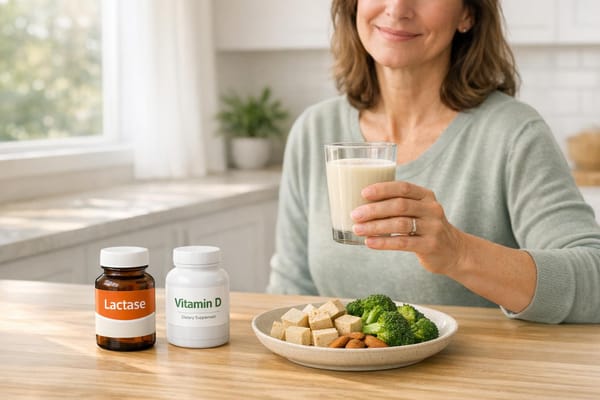Probiotics and Enzymes: Safe to Take Together?
Learn how probiotics and digestive enzymes work together to enhance digestion and gut health, and discover the best practices for taking them safely.

Yes, you can safely take probiotics and digestive enzymes together. They serve different purposes but complement each other to improve digestion and gut health. Here's how they work:
- Probiotics: These are live bacteria that support a healthy gut microbiome, aiding digestion, immune function, and nutrient absorption.
- Digestive Enzymes: These proteins break down food into nutrients your body can absorb, targeting carbs, proteins, and fats.
Benefits of Taking Them Together:
- Better digestion and reduced bloating.
- Improved nutrient absorption.
- Relief for food intolerances like lactose intolerance.
- Enhanced gut health and energy levels.
Safety Tips:
- Start with a low dose to avoid mild side effects like gas or bloating.
- Take probiotics 30 minutes before meals and enzymes during meals for best results.
- Consult a doctor if you're pregnant, immunocompromised, or taking medications.
By pairing probiotics and enzymes, you can support your digestive health more effectively. Always choose high-quality supplements and follow proper storage guidelines for maximum benefits.
Digestive Comfort: Are Digestive Enzymes and Probiotics the Same Thing?
Safety of Taking Probiotics and Enzymes Together
For most people, taking probiotics and digestive enzymes together is considered safe. These supplements serve different roles - enzymes help break down food, while probiotics maintain a healthy gut environment. Together, they can complement each other to support better digestion and overall gut health.
General Safety Guidelines
In general, combining probiotics and digestive enzymes doesn’t cause serious side effects for most users. However, some people may initially experience mild symptoms like gas, bloating, or discomfort. These issues are usually temporary and tend to decrease as your body adapts.
The risk of infections from probiotics is extremely rare. For example, research shows that the likelihood of developing an infection from probiotics containing Lactobacilli bacteria is about one in one million. For yeast-based probiotics, the risk is even lower - approximately one in 5.6 million users.
To reduce the chances of side effects, it’s a good idea to start with a smaller dose of probiotics and gradually increase to the recommended amount. If you have food allergies or intolerances, always check the ingredients on supplement labels to avoid any unwanted reactions. These steps can help you use probiotics and enzymes safely while knowing when it’s time to seek professional advice.
When to Consult a Doctor
While probiotics and enzymes are safe for most people, there are situations where consulting a doctor is essential. For example, if you’re pregnant, breastfeeding, immunocompromised, or taking prescription medications, it’s important to get medical advice before starting these supplements.
If you’re on antibiotics, it’s recommended to take probiotics at least two hours before or after your antibiotic dose. This timing helps protect the beneficial bacteria from being destroyed by the medication. Additionally, seek immediate medical attention if you experience symptoms like persistent fever, chills, or a sore throat.
For ongoing digestive issues - such as prolonged diarrhea, constipation, severe abdominal pain, nausea, or persistent bloating - consult a healthcare professional, especially if symptoms worsen after starting probiotics or enzymes. A doctor specializing in digestive health can provide tailored advice on the best probiotics and enzymes for your specific needs.
Benefits of Taking Probiotics and Enzymes Together
Pairing probiotics with digestive enzymes can work wonders for your digestive system. They complement each other by breaking down food into nutrients your body can absorb and by keeping your gut flora balanced. Let’s dive into some specific perks of this dynamic duo.
Better Digestive Support
One standout advantage is improved digestive health. Digestive enzymes help break food down quickly and efficiently, while probiotics maintain a healthy gut environment by supporting vitamin production and forming a barrier against harmful bacteria. This combination can ease common digestive woes like bloating, gas, and indigestion. In fact, a 2022 study highlighted that using both supplements together improved gut barrier function and reduced discomfort.
Improved Nutrient Absorption
Probiotics and enzymes also team up to enhance how your body absorbs nutrients. Enzymes break food into smaller, absorbable pieces, while probiotics keep the intestinal lining healthy, ensuring optimal uptake of vitamins and minerals. This partnership boosts nutrient bioavailability, helping your body make the most of what you eat.
Support for Food Intolerances
For those dealing with food intolerances, this combination offers targeted relief. Take lactose intolerance, for example - enzyme supplements supply lactase to assist in digesting dairy, while probiotics encourage your body’s natural lactase production. Studies show that regularly consuming probiotic-rich foods can improve lactose digestion and increase tolerance over time.
How to Take Probiotics and Enzymes Together
Timing plays a crucial role in getting the most out of probiotics and enzymes. Since these supplements work differently within your body, knowing when and how to use them can make a big difference in their effectiveness.
Timing and Dosage
Strategic timing is essential for probiotics and enzymes to perform at their best. Each has its own ideal window for maximum impact.
For probiotics, aim to take them about 30 minutes before meals. This gives the beneficial bacteria a better chance to bypass stomach acid and reach your intestines where they can thrive.
For enzymes, timing is slightly different. Take them within 30 minutes of eating to ensure they are present when food enters your stomach. This helps break down proteins, fats, and carbohydrates more efficiently.
Start with a low dose and increase gradually based on your body's response. For probiotics, most adult supplements should include at least 1 billion CFUs (colony forming units) per dose. Many effective products range from 1 to 10 billion CFUs daily, though some specialized formulations can go up to 100 billion CFUs. It’s best to follow the manufacturer’s recommendations when starting out.
With enzymes, begin by taking them with one or two meals a day. Gradually increase as needed to avoid any unwanted side effects.
"Consistency is the key with taking probiotics if one wants to reap the potential benefits." - Michael Asike, M.D., Practicing Gastroenterologist, GBMC Healthcare
Once you've established proper timing and dosage, choosing high-quality supplements becomes the next step.
Choosing Quality Supplements
Look for supplements from reputable brands that meet strict quality standards, such as those from CRN member companies. High-quality products, combined with proper timing and storage, can significantly improve digestion and nutrient absorption.
Storage and Handling
Proper storage is just as important as timing. To maintain the potency of your supplements, store them in a cool, dry, and dark place. Avoid areas like bathrooms or kitchens, where temperature and humidity levels can fluctuate.
Whenever possible, keep supplements in their original containers, as these are designed to protect against light and moisture. If you must transfer them, use airtight containers, and in humid climates, consider adding desiccant packets to reduce moisture exposure.
Some probiotics need to be refrigerated, while others are shelf-stable. Always check the label for specific storage instructions. Even shelf-stable probiotics benefit from cool storage to maintain their effectiveness.
"You'll get the most benefits if you do it daily." - Gail Cresci, PhD, RD, LD, Digestive Disease Researcher and Registered Dietitian
Consistency is key to maximizing the benefits of both probiotics and enzymes. Additionally, pay attention to expiration dates. Over time, live probiotics lose their viability, and enzymes may lose their activity. Replace products as needed to ensure you're getting the full benefit.
When traveling, take extra precautions. Use containers with moisture-proof seals and temperature insulation to protect your supplements from environmental changes. This helps maintain their effectiveness, even when you're on the go.
Example: Enzyme Support for Lactose Intolerance
Lactose intolerance affects a staggering 30–50 million Americans, making it one of the most widespread digestive challenges in the United States. For those who enjoy dairy but struggle with digestion, enzyme supplements can offer a targeted solution, especially when paired with probiotics for more comprehensive digestive care.
milktab's Triple-Enzyme Formula

milktab provides a practical and effective answer to lactose intolerance with its triple-enzyme formula. Each tablet contains 27,000 FCC units of lactase, 22,000 FCC units of protease, and 1,000 FCC units of lipase, ensuring it can break down lactose, milk proteins, and fats efficiently. This formula tackles all three major components in dairy that often cause discomfort, making digestion smoother and more complete.
Customer feedback highlights the product's effectiveness. Christina, a verified user, shared her experience:
"One tablet does the work of six Lactaid pills, and the extra enzymes cover everything the other brands miss. Good stuff."
milktab is also designed with convenience in mind. The pills are compact, vegan, non-GMO, and FODMAP-free, making them suitable for a range of dietary needs. With an Amazon rating of 4.2 out of 5 stars from 61 reviews, users consistently report improved digestion and reduced discomfort when consuming dairy.
How milktab Works with Probiotics
Beyond its enzyme benefits, milktab works seamlessly with probiotics to promote overall digestive health. While milktab's enzymes break down dairy components at the moment of consumption, probiotics help maintain a balanced gut environment, supporting long-term nutrient absorption and digestive well-being.
The timing is key for maximizing benefits. For those with lactose intolerance, the suggested approach is simple: take your probiotic about 30 minutes before meals to help beneficial bacteria reach your gut, and then take milktab with your dairy-containing meal to ensure the enzymes are ready to break down lactose, casein, and milk fats.
Experts also back this approach:
"Yes, you can take digestive enzymes and probiotics together! In fact, many health experts suggest that doing so can provide optimal support for your digestive system."
Real-world experiences further validate this combination. Juana, another satisfied milktab user, shared:
"Milktabs WORK!! I went on a European vacation and ate all the cheeses I wanted - zero issues the whole trip."
Key Points About Probiotics and Enzymes
Main Benefits
When probiotics and enzymes are used together, they can work in harmony to support better digestion. This combination helps reduce bloating, enhances nutrient absorption, and assists in managing food intolerances, making it easier for your body to break down challenging components in certain foods. Beyond digestion, this duo can also contribute to higher energy levels and bolster immune health.
Final Tips
To make the most of probiotics and enzymes, here are some practical suggestions:
- Focus on Quality: Look for supplements with a variety of strains, clinically effective dosages, and minimal additives. Choosing reputable brands ensures you're getting the active ingredients your body needs.
- Timing Is Key: Take probiotics about 30 minutes before meals, while enzymes are most effective when taken during meals.
- Pay Attention to Your Body: Observe how your body responds to these supplements. Adjust dosages if necessary to find what works best for you.
- Consult a Professional: If you have existing health conditions or take medications, it's wise to seek advice from a healthcare provider to customize your supplement plan.
- Pair with a Healthy Diet: Supplements work best when combined with a diet rich in whole, nutrient-dense foods that naturally support digestion.
FAQs
Are there any side effects of taking probiotics and digestive enzymes together, and how can you avoid them?
Taking probiotics and digestive enzymes at the same time is generally considered safe. However, some people might notice mild side effects such as gas, bloating, diarrhea, constipation, or nausea. These reactions are typically short-lived as your body adjusts to the supplements.
To reduce the chances of discomfort, you can start with a lower dose and gradually increase it over time. Taking these supplements with meals may also ease any potential digestive issues. It's important to avoid using enzyme supplements for extended periods without consulting a healthcare provider, as this could impact your body's natural enzyme production. If any side effects persist, stop using the supplements and reach out to a healthcare professional for further advice.
Can probiotics and digestive enzymes help with lactose intolerance?
Yes, probiotics and digestive enzymes can play an important role in managing lactose intolerance. Probiotics help maintain a healthy balance of gut bacteria, which can ease digestion and alleviate symptoms like bloating and discomfort. On the other hand, digestive enzymes - specifically lactase - assist in breaking down lactose found in dairy products. This can help reduce common issues like gas and diarrhea.
When used together, probiotics and lactase enzymes complement each other. Probiotics support gut health, while enzymes directly aid in digesting lactose, creating a more effective way to handle dairy-related discomfort. This combination provides a well-rounded approach to improving digestion and addressing the challenges of lactose intolerance.
How can I choose high-quality probiotics and enzyme supplements for the best results?
When selecting probiotics, aim for supplements that contain at least 1 billion CFUs (colony-forming units) and strains such as Lactobacillus or Bifidobacterium. These strains are well-researched and commonly associated with gut health. Look for certifications like GMP (Good Manufacturing Practices) or Non-GMO to ensure the product meets safety and quality standards.
For enzyme supplements, choose broad-spectrum blends that include enzymes like protease, lipase, and amylase. These are essential for breaking down proteins, fats, and carbohydrates effectively. It's also important to check for clear labeling of ingredients and enzyme activity levels - these details can help you identify a trustworthy product.
Focusing on these criteria can help you choose supplements that are both safe and effective.



